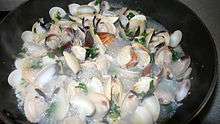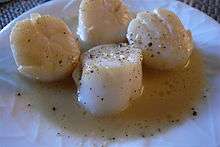Wine sauce
Wine sauce is a culinary sauce prepared with wine as a primary ingredient, heated and mixed with stock, butter, herbs, spices, onions, garlic and other ingredients. Several types of wines may be used, including red wine, white wine and port wine. Some versions are prepared using a reduction. Several types of wine sauces exist, and it is used in many dishes, including those prepared with seafood, poultry and beef. Wine sauces are associated with French cuisine.
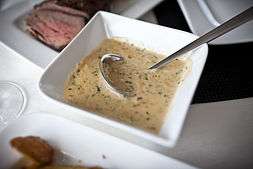
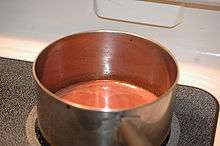
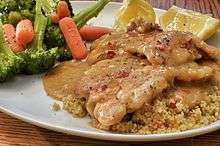
Ingredients and preparation
Wine is a primary ingredient in wine sauce.[1] Wine sauce may be prepared using various wines, such as red wines, white wines, Burgundy wines,[1] and port wines, among others. Ingredients in addition to wine may include stock, mushrooms, butter or shrimp butter, tarragon vinegar, shallot, chervil, tarragon, spices,[2] onion, garlic and others. Some wine sauces are prepared using a reduction, which may intensify their flavor or make the flavor sharper.[1][3] Reduced wine may be used to prepare thicker wine sauces, while those lacking a reduction are generally thin.[3] Some wine sauces are creamy,[4] prepared with the addition of cream or milk.
Fish velouté is a French velouté sauce base from which several types of sauces can be prepared, including wine sauce.[5] White wine sauce and champagne sauce are the most common sauces prepared from a fish velouté base.[5]
Varieties
Several types of wine sauces exist using wine as a primary ingredient. Sauce poivrade is a wine sauce in French cuisine that is prepared with mirepoix thickened with flour and moistened with wine and a little vinegar, then heavily seasoned with pepper.[6] Sauce Bourguignonne is a French sauce with a base of red wine with onions or shallots. Bordelaise sauce is a classic French sauce prepared with red wine, meat glaze or demi-glace, butter, shallots and bone marrow.[7] Sauce lyonnaise is a French sauce prepared with white wine, vinegar and onions,[8] which may be served with meat.
Some sauces, such as Normande sauce, use wine as a flavorant,[9] rather than as a main ingredient.
- Wine sauces
.jpg) White wine sauce with shallot being cooked
White wine sauce with shallot being cooked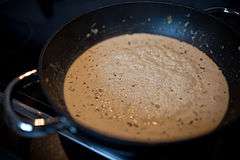 Sauce poivrade being cooked
Sauce poivrade being cooked
Use in dishes
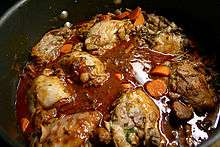
Wine sauce may be used in seafood dishes, such as those prepared using tuna and salmon.[1] White wine sauce has been described as "a classic sauce for fish".[5] It is used for poultry dishes, such as chicken, quail[1][10] and others. Coq au vin is a French chicken dish that may be prepared using wine sauce prepared from red or white wine.[1] It is used in various beef dishes. Swiss steak is sometimes prepared with wine sauce.[10] Pork dishes may also be prepared with it, such as those prepared from boneless pork loin or pork tenderloin.[11] It may be used with rabbit dishes, and with some wild game dishes.[10][12] Vegetarian dishes may also be prepared using wine sauce.[13]
Wine sauce is sometimes used as a marinade for seafood preparations, such as herring in wine sauce, which is prepared by allowing cured herring to soak in a vinegar and wine sauce.[14] This may be performed with the fish and sauce in jars.[14] The wine sauce for this preparation is made by boiling vinegar, wine, onion, sugar and spices, such as bay leaf, cinnamon, clove, allspice, ginger, nutmeg and pepper, after which is rests to allow time for the ingredients to incorporate their flavors.[14] Afterward, the sauce is strained and used to marinate the herring.[14]
Additionally, plain wine itself without any further preparation may be used as a sauce on foods, such as on pears or on desserts such as ice cream.[3]
See also
- List of sauces
- Wine and food matching
References
| Wikimedia Commons has media related to Wine sauce. |
- Parker, Robert M. (2008). Parker's Wine Buyer's Guide, 7th Edition. Simon and Schuster. p. 15. ISBN 1439139970.
- Gisslen, Wayne; Griffin, Mary Ellen; Le Cordon Bleu (2006). Professional Cooking for Canadian Chefs. John Wiley & Sons. p. 173. ISBN 0471663778.
- Powell, Richard (2009). Richard's "Rough-as-Guts" Cookbook and Cooking Companion. Lulu.com. p. 25–26. ISBN 0980368340.
- Simon, Joanna (1997). Wine with Food. Simon and Schuster. p. 27. ISBN 0684835223.
- Berg, Ron. Northwoods Fish Cookery. U of Minnesota Press. p. 218–219. ISBN 1452904782.
- André L. Simon, A concise encyclopedia of gastronomy, 1952, p. 39
- Peterson, James (2012). Sauces, Salsas, and Chutneys. Ten Speed Press. ISBN 1607744015.
- Grimsdale,Gordon (1986). The Book of Sauces. Penguin. p. 76. ISBN 0895865041.
- "Normande sauce". Merriam-Webster. Retrieved 14 September 2014.
- Berolzheimer, Ruth (1988). Culinary Arts Institute Encyclopedic Cookbook. Penguin. p. 857. ISBN 0399513884.
- "Chicken or Pork with Mushrooms in Red Wine Sauce". WRIC. Retrieved 15 September 2014.
- Correa, Zach (May 21, 2014). "Braised rabbit with white wine sauce". WBRZ. Retrieved 15 September 2014.
- "Braised Seitan Cutlets in Mushroom and Red Wine Sauce". Vegetarian Times. January 2009. Retrieved 15 September 2014.
- Martin, Roy E.; (et al,.) (2000). Marine and Freshwater Products Handbook. CRC Press. p. 405. ISBN 1566768896.CS1 maint: multiple names: authors list (link)
